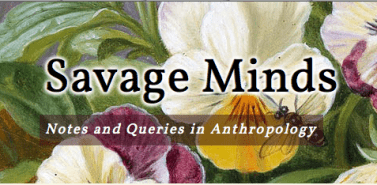Dear Savage Mind,
We are approaching you in the singular, for if our understanding is correct, it was just one ‘savage mind’ that got the blog with the same name going – is this correct? Now of course things have changed dramatically, and the title really should be in the plural for the list of contributors is large and impressive. Just what are the numbers today, and how did you arrive here?
“Actually, we’ve always been a group blog. Back in the day Kerim and I read each other’s blogs, and thought about launching a group blog. When we finally unveiled the site in April 2005 the full roster was Chris Kelty, Dustin Wax, Alex Golub, and Kerim Friedman. We wrote an article about it in 2008.
It’s a bit hard to say how many contributors we’ve had over the years since the different categories of membership have changed over time. I think we’ve had about 15 ‘Minds’, around 70 guest bloggers, and maybe a couple of dozen ‘invited posts’. At the moment We have about 10 full time Minds. Some write regularly, while others advise behind the scenes. People have come and gone over time. It’s difficult finding people who write regularly, as I’m sure you know.”
 You got started in 2005 and quickly received vast acclaim as for example Nature ranked Savage Minds 17th out of the 50 top science blogs across all scientific disciplines We have no doubt that this was all well warranted due to spectacularly high quality content, but was this speedy recognition in all honesty, in your view, also symptomatic of certain ‘tardiness’ on the part of our beloved discipline. I am speaking, of course, of the hesitation, even reluctance of anthropologists to get online.
You got started in 2005 and quickly received vast acclaim as for example Nature ranked Savage Minds 17th out of the 50 top science blogs across all scientific disciplines We have no doubt that this was all well warranted due to spectacularly high quality content, but was this speedy recognition in all honesty, in your view, also symptomatic of certain ‘tardiness’ on the part of our beloved discipline. I am speaking, of course, of the hesitation, even reluctance of anthropologists to get online.
“Well, the Internetz were different back in 2005. Blogging was a form of self-expression, and people didn’t clearly separate ‘personal’ and ‘professional’ when they blogged. In fact, the appeal of blogging was the way that it broke down those barriers. I started blogging in 2002, and back then if you wanted to read my thoughts on anthropology, you had to scroll past my Jedi fan fiction and waffle recipes.
There was also much less concern with disciplinarity. my biggest interlocutors on the Internet were an Anglican priest and a management consultant. The conversation crossed boundaries in incredibly stimulating ways, and I’m so grateful that I came of age at that time.
So I don’t think anthropologists were reluctant to go online at all, its just that we weren’t interested in taking the hierarchies and boundaries of our academic discipline online. Savage Minds received recognition quickly because we were the first people to say “We are, officially, just going to write about anthropology.” But we could only do this because there were already lot of anthropology bloggers out there — we felt that we had reached a critical mass of people who would read a blog that was only anthropology!
 But on the other hand, yes, you’re right: Like a lot of innovations, blogging was initially for the young and peripheral and only slowly moved to the center. Mid-career academics didn’t blog much at first. This was not true of all disciplines. The key here is understanding how prior written genres were or weren’t easily transferrable to an online form.
But on the other hand, yes, you’re right: Like a lot of innovations, blogging was initially for the young and peripheral and only slowly moved to the center. Mid-career academics didn’t blog much at first. This was not true of all disciplines. The key here is understanding how prior written genres were or weren’t easily transferrable to an online form.
There are some academic disciplines that have always sought a public audience. Early bloggers like Crooked Timber, Volokh Conspiracy, and others all had pre-existing genres where there was a role for public debate, a desire to be ‘relevant’, to inform policy, and to influence people. So those people took very naturally to blogging.
Similarly, a lot of people in the natural sciences started blogging early because blogging fit with earlier genre concerns of theirs: science writing for a general audience, a desire to publish research results as early as possible, a need to build your reputation in order to be attractive to funders, etc.”
“Anthropologists didn’t have genres that looked like blogs. They are often suspicious of collaborating with the powerful, and worry about the privacy and confidentiality of their research community. So for them not blogging was prudent and ethical. As a result, it took longer for anthropology as anthropology to go online. When it did, I think it was adopted with the speed that it was because of the way that people like me weren’t peripheral: We were white men from top departments. This helped people see blogging as ‘a bleeding edge trend’ not ‘something the hoi polloi are doing and will never be done at Chicago’.”
Moving into the present and future: Last year we’ve seen an avalanche of talk of ‘the ontological turn’. Are we done with this talk now, you think, in other words, where do you see the future of our discipline lie? Suppose for us this question has also a slight critical edge to it: as Isaac Morrison wrote in early on this year for Allegra, there is a whiff of navel-gazing with all this talk of these ‘turns’, you agree? It occasionally almost feels as if we collectively forget that we are actually supposed to be studying something besides ourselves! Again, this is starkly put, but do you see any truth in this?
“Well, a lot of things are covered under the term ‘ontological turn’, some of which have very little in common with each other. But overall I think the basic pros and cons of that approach were more or less apparent by 2008. The question last year was whether or not generic American cultural anthropologists would pick it up. I think in the long run, the turn is not for me and will not be very appealing to a lot of people in the US… although they may still may try to engage since they assume that is the hot thing these days. When I look at exciting work being done, I think of the anthropology of infrastructure or of ethics — and course my own field, anthropology of mining, petroleum, and the corporation.
 That said, I think reflexivity is a central, important, and healthy part of our discipline. Anthropology is constantly questioning itself: What kind of knowledge is knowledge of people? What kind of writing best conveys that knowledge to a reader? Most disciplines are founded on a particular way of answering these questions, while anthropology is founded on questioning them. Other disciplines grind out decades of papers on ‘deviance’ but we are always stepping back and saying “Wait a second, what do we actually mean by ‘deviance’? Is that really there in my fieldnotes?”
That said, I think reflexivity is a central, important, and healthy part of our discipline. Anthropology is constantly questioning itself: What kind of knowledge is knowledge of people? What kind of writing best conveys that knowledge to a reader? Most disciplines are founded on a particular way of answering these questions, while anthropology is founded on questioning them. Other disciplines grind out decades of papers on ‘deviance’ but we are always stepping back and saying “Wait a second, what do we actually mean by ‘deviance’? Is that really there in my fieldnotes?”
To me the most valuable part of the turn was the way it forced us to get clear about our underlying sensibilities and ask: does ontology satisfy them? Is this how I want to write ethnography? What is the point of our discipline? Too often we muddle along from enthusiasm to enthusiasm without answering these questions, despite that fact that anthropology’s distinctive feature is precisely a form of reflexivity which should be healthy!
Anthropology is a modernist project, and a certain breathless fadism is part of embracing the new. But I don’t think excitement for an ‘ontology’ fad is as helpful as a deeper reflexivity. In some ways, the people at the center of the turn do a better job thinking through these issues than someone who throws a few decorative citations to Viveiros de Castro into their article.”
To continue in a similar vein: we get that the name of Savage Minds has certain playful layers too (for all unfamiliar with this tale, we urge you to consult that ‘About’ section of Savage Minds to see the word play of Lévi-Strauss’ original title in French!), yet the title undoubtedly is from one of the best known classics of anthropological research. Now we have seen an interesting similar revival with HAU: Journal of Ethnographic Theory. We’re not quite sure how to take this – is the subtext to insinuate that our noble discipline is most potent and ‘true’ if it stays with its classical roots – the study of the ‘exotic other’?
Or are we getting ahead of ourselves? To explain this question further: where do you see the greatest relevant or explanatory potential of anthropological scholarship to lie?
Or do you find this question even meaningful? We suppose we insist with these questions do to our increasing sentiment that, as we examine seemingly different field sites – be it islamic legal actors in the UK, NGO workers in the Middle-East, UN bureaucrats in Geneva or even academics engaged in their/our regular professional endeavours, we are increasingly exposed to a sense of ‘radical sameness’, not ‘radical difference’ which is what we have largely been seeing and hearing around us.
“We occasionally get flack for ‘Savage Minds’ from people who think we’re calling indigenous people ‘savages’ or trying to co-opt their identity or something, which is totally not the case. We chose the name because we wanted the blog to be playful and protean and full of pensée sauvage. Both our blog and Lévi-Strauss’s book have a title which describes the author’s thought! Sometimes people don’t get that dimension of the pun. Also, we liked that our mascot is a flower. A purple flower. It immediately helps diffuse an urge to a certain sort of bullshit academic masculinity.
You ask about anthropology’s potential and relevance. I’ve talked about anthropology’s hallmark reflexivity already, but I think the discipline is also unique because it has a unique object of study: the sociocultural. Some call it ‘culture’ while others call it ‘society’ or ‘the social’. I think we’re at a point know where we have theoretical frameworks powerful enough to synthesize both these concepts.
 We’re also wonderfully schizophrenic in our simultaneous commitment to extreme particularity and extreme generality. We want ethnography that tells you what day the pig was killed, who butchered it, who was given the neck, who the legs, and so forth. But then we take this close ethnographic account and use it to make an argument about the fundamental nature of human being. It’s absolutely mad and unbelievably wonderful.
We’re also wonderfully schizophrenic in our simultaneous commitment to extreme particularity and extreme generality. We want ethnography that tells you what day the pig was killed, who butchered it, who was given the neck, who the legs, and so forth. But then we take this close ethnographic account and use it to make an argument about the fundamental nature of human being. It’s absolutely mad and unbelievably wonderful.
I guess this is a way of saying that for me, anthropology has never been about culture shock or white people studying brown people. I think it’s ludicrous to tell a European they can’t study the European parliament, or to tell a Hawaiian that they can’t study the politics of indigeneity.
Anthropology has always been a cosmopolitan project. The second person to earn a Ph.D. with Franz Boas — before Lowie, Sapir, Radin, or Goldenweiser — was William Jones, an Indian! Malinowski got the LSE to waive course requirements so that Jomo Kenyatta could finish his anthropology degree in good time. John Dollard’s Caste and Class In a Southern Town came out in 1937. Hortense Powdermaker’s ethnography of Hollywood came out in 1950. Pitt-Rivers’s Spanish ethnography People of the Sierra was 1954. Lupton’s shop-floor ethnography in 1962. Firth’s London Kinship Project was publishing by 1968. Bruce Kapferer’s study of factory workers came out in 1972. Cris Shore’s study of Italian communists was in 1990. The list goes on and on.
One can quibble that early ethnography of Europe was exoticizing, and shop-floor ethnography was classist. Anthropology is often criticized for being colonial and evil and there’s a lot of truth to that claim, but the reason the discipline sometimes goes sideways is that its practitioners and topics are always crossing cultural,racial, and ethnic boundaries. Given this fact, the question is not ‘are we doing more of this now?’ but ‘why do we think we haven’t always done this’? I think Allegra should raise its head tall and claim that genealogy for itself and emphasize that what it is doing is what anthropology has always done.
That said, I had a very traditional fieldwork experience, undergoing extreme culture shock in the highlands of Papua New Guinea. That was very valuable for me and I think it’s a bit sad that people no longer have the chance to grow by experiencing ways of life radically different from their own. Its broadening. It’s true that today more people wear t-shirts and have mobile phones than they used to. But unfortunately, global poverty is not disappearing, and neither is anthropology’s tendency to recruit from the upper middle class. I try to see an upside in this: as long as anthropologists do fieldwork in places where people grow their own food and build their own houses, there will always be culture shock.”
Finally, let’s talk a bit of us, please! We remain extremely pleased with the warm reception that we have enjoyed from the anthropological blogging scene as well as the surprising numerous people who call themselves our ‘fans’, praising us to be a ‘breath of fresh air’ in the anthro-blogosphere. While we are vein enough to interpret this as honest praise for the hard work that we are doing, we are simultaneously wondering if there is another side too – for the things that we have been doing are not all THAT spectacular (that is, compared to all the things we HOPE to be doing one day soon!)
What do you think of the anthro-blog scene at the moment, or the social science / scholarly blog scene more generally?
We’re wondering if there isn’t a bit of fatigue around – as if after an invigorated start when many people were hugely enthusiastic for the possibilities to just have your say RIGHT NOW with no intermediaries people are feeling discouraged by all the collective noise that the virtual world is producing.
And let’s face it: our current academic grading patterns do not exactly reward active online activities.
 “Well you’re exactly right — your popularity is inversely related to the depth and complexity of your content. If you want thousands of fans, keep on producing incoherent 500-word rants about Beth Povinelli’s hair, or airbrush Foucault’s face onto photos of kittens and post the link on twitter. You will have tons of fans for the next 18 hours, all of whom will spend ten seconds on your blog. They can retweet your content without even bothering to read it! It’s good for a laugh, and provides distraction for a moment or two. Who wouldn’t want to be a fan of that? This is the sad truth of the Internet: it’s easy to be famous. If you want to be the Buzzfeed of anthropology, then go for it — that niche is open. But I’m sure Allegra is aiming for something higher than that, eh?
“Well you’re exactly right — your popularity is inversely related to the depth and complexity of your content. If you want thousands of fans, keep on producing incoherent 500-word rants about Beth Povinelli’s hair, or airbrush Foucault’s face onto photos of kittens and post the link on twitter. You will have tons of fans for the next 18 hours, all of whom will spend ten seconds on your blog. They can retweet your content without even bothering to read it! It’s good for a laugh, and provides distraction for a moment or two. Who wouldn’t want to be a fan of that? This is the sad truth of the Internet: it’s easy to be famous. If you want to be the Buzzfeed of anthropology, then go for it — that niche is open. But I’m sure Allegra is aiming for something higher than that, eh?
Blogging did have an ‘invigorated start’ — in about 2004. Soon anthropology got into act. Savage Minds and Zero Anthropology got started in 2005, Media/Anthropology and Culture Matters in 2006, Somatosphere in 2008, and Anthropolitea in 2009. In 2010 they were featured in American anthropologist, which indicates they had attracted the mainstream — that is, they were now old-fashioned. Jason Antrosio started blogging in 2011, and I think of him as ‘the new guy’. Now blogs are old hat. So comparatively, Allegra is relatively late on the scene.
I mean, who even reads blogs anymore? Back in the day blogging flourished because the genre seemed faster, more vital, and less confined than books. Unique communities, like the University of Blogaria, formed. A variety of blog communities (linked by ‘blog rings’ or ‘blog rolls’ as they used to be called) existed, and you could use the new search engine ‘Google’ to find them, or read them using a new-fangled format called ‘rss’. But they were still relatively balkanized. And — maybe I need to say this for people who don’t remember back that far — there was no such thing as Twitter or Facebook.
 Today, blogs are just one element in a rich ecosystem of social media. The velocity of information has increased dramatically, the quality and length of content has fallen, and the total volume has increased by orders of magnitude. I value the democratic, public nature of twitter and, to a lesser extent, Facebook and other social networking sites.Twitter has really created an anthropological public in a way blogs could not. It’s incredible. But I’m not that interested in the content it produces. I find it too easy to be successful, and as I get older, the easy wins are less and less interesting to chalk up.
Today, blogs are just one element in a rich ecosystem of social media. The velocity of information has increased dramatically, the quality and length of content has fallen, and the total volume has increased by orders of magnitude. I value the democratic, public nature of twitter and, to a lesser extent, Facebook and other social networking sites.Twitter has really created an anthropological public in a way blogs could not. It’s incredible. But I’m not that interested in the content it produces. I find it too easy to be successful, and as I get older, the easy wins are less and less interesting to chalk up.
If twitter is the roiling surface of the Internet ocean, blogs are its depths, or at least its middle level. At its best social media provides an index to blog content, filtering and aggregating it for users. It also increasingly provides a forum for discussing blog content (who reads the comments on a blog any more?). But at its worst social media makes the competition for eyeballs and attention unwinnable for slower forms of media like blogs. The signal to noise ration gets worse and worse, sadly.
I think you’re right to sense fatigue or disorientation. It’s the result of a mediascape that is so fast, so shallow, and so broad that no one has any sense of what the master narrative is anymore. But blogs didn’t create this problem — social media did.
You write that “our current academic grading patterns do not exactly reward active online activities.” I don’t think that’s true. Having an Internet presence gives one a lot of soft power in the academy. And in fact it is getting easier and easier to demonstrate the value of social media presence to members of promotion and review committees. Today sites like Impact Story, the LSE Impact blog, and many others are demonstrating how our work has an impact in online spaces. Wiley actually has ‘altmetrics’ (as they’re known) baked right into its website now. It’s remarkable.
I’m sure Allegra’s authors don’t get the recognition they deserve inside the academy for the pieces they write but actually I think we are living in a much happier time than we were ten years ago. I blog under a pseudonym because when I started the blog, I thought I might be punished in the job market if my identity was well known. Today it seems crazy to think that having a social media presence is unprofessional, but not so long ago this seemed a real concern.”
So what is your take: are we collectively living up to the promises of virtual spaces – what else should we be doing? What kind of things would you want to see us & other newcomers doing – and what do you envision that the anthro-blog scene will look like in, say, 5,10 years? What would be needed in order for things to stabilise themselves and for blogs to really start living up to the promises that they hold?
“A lot of people want to do FoucaultCats and I totally encourage them to do that if they want to. Who doesn’t want to see FoucaultCats? I don’t want to sound like a curmudgeon, but I think — and I’m sure you agree with me — that blogs are useful for the way they slow the conversation down and create communities of people who are united in their commitment to a topic and in their investment of their attention to it. Blogs are the connective tissue between twitter and journal articles. In the past year or so I’ve tried to use conference reports, book reviews, and interviews to give people a sense of where the discipline is now.”
“This, I think, is what makes Savage Minds unique: lots of blogs have reading lists that cover ‘ontology’, but we have a 4,500 word interviews with Michael Scott and a 5,600 (!) word interview with Eduardo Kohn. A lot of blogs have short conference reports, but we have a 2,3000 word summary of a webinar on which report on the substance of these conversations. I know Allegra is interested in doing more of these, and I’d love to see you move in this direction. Its harder than FoucaultCats, but its much more worthwhile. And after doing it for a while, people really start to realize the substantive value of your work. Its exhausting work, a sort of ‘anthropology beat’ in the journalistic sense of the word, but its what the discipline and our readers deserve. And when you do it well, people start respecting you — and you know that respect comes from their opinion of your work, not your position in an academic hierarchy. It’s earned.
 The other thing I think Allegra needs to realize is: Churn Happens. Anthropology blogging seems new and vital to you because you are new and vital and a great addition to the blogosphere. But over time there has been a lot of ambitious projects. You just don’t see them because they’ve already failed. Consider, for example, the first fully open access peer reviewed general anthropology journal. I’m not talking about HAU. I’m talking about After Culture. What?You don’t remember it? Well, that’s because it folded after one article. Or how about the brand new collaborative blogging platform that would give a blog to every anthropologist, anthroblogs.org? Or four stone hearth? Or antropologi.info? They all had great first years. Some of them even had great third years. But really keeping something going, long term — that’s not easy. So as Allegra moves forward, I’ll give you the same challenge I gave HAU: Don’t strive for the first anniversary, strive for the fifth anniversary. Stay focused and realize that failure is the default option unless you actively get to the keyboard and write. You’re having your triumph now, so I suppose its my job to stand behind you and whisper in your ear “remember: thou art mortal.”
The other thing I think Allegra needs to realize is: Churn Happens. Anthropology blogging seems new and vital to you because you are new and vital and a great addition to the blogosphere. But over time there has been a lot of ambitious projects. You just don’t see them because they’ve already failed. Consider, for example, the first fully open access peer reviewed general anthropology journal. I’m not talking about HAU. I’m talking about After Culture. What?You don’t remember it? Well, that’s because it folded after one article. Or how about the brand new collaborative blogging platform that would give a blog to every anthropologist, anthroblogs.org? Or four stone hearth? Or antropologi.info? They all had great first years. Some of them even had great third years. But really keeping something going, long term — that’s not easy. So as Allegra moves forward, I’ll give you the same challenge I gave HAU: Don’t strive for the first anniversary, strive for the fifth anniversary. Stay focused and realize that failure is the default option unless you actively get to the keyboard and write. You’re having your triumph now, so I suppose its my job to stand behind you and whisper in your ear “remember: thou art mortal.”
When I try to imagine where we’ll be five or ten years from now, I think of Vernor Vinge’s science fiction novel A Deepness In The Sky. The hero of that book is thousands of years because he spends centuries at a time in suspended animation traveling between stars. When he wakes up, technology has advanced, and all of the new computer systems are built on top of the old ones. He solves problems and saves the day because he’s the only person who remembers that buried in thousand-year old code is a backdoor or function that he alone knows about and can be used to Win.
I think that blogs will be like that. We’ll still be here. We may be less relevant, less easy to find, and less read than newer forms of media. But we’ll still be posting good work — although it will probably be filtered and aggregated by a variety of newer forms. The Internet will probably be more commercial, more controlled by the government, more expensive to access, and less open. Academia will be smaller, with larger centers of gravity in the amateur and applied communities. But blogs will still be there, and they’ll still be important, because they’ll be shaping the conversation, and they’ll be shaping the careers of future anthropologists. I’m looking forward to it.”





